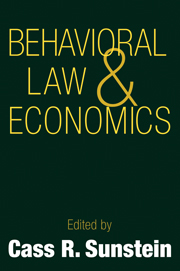Book contents
- Frontmatter
- Contents
- Contributors
- Acknowledgments
- Introduction
- Part I Overview and Prospects
- Part II Heuristics and Biases: Shortcuts, Errors, and Legal Decisions
- Part III Valuation: Values and Dollars in the Legal System
- 8 Experimental Tests of the Endowment Effect and the Coase Theorem
- 9 Assessing Punitive Damages (With Notes on Cognition and Valuation in Law)
- 10 Framing the Jury: Cognitive Perspective on Pain and Suffering Awards
- 11 Behavioral Economic Analysis of Redistributive Legal Rules
- 12 Do Parties to Nuisance Cases Bargain After Judgment? A Glimpse Inside the Cathedral
- Part IV The Demand for Law: Why Law Is As It Is
- Index
10 - Framing the Jury: Cognitive Perspective on Pain and Suffering Awards
Published online by Cambridge University Press: 05 June 2012
- Frontmatter
- Contents
- Contributors
- Acknowledgments
- Introduction
- Part I Overview and Prospects
- Part II Heuristics and Biases: Shortcuts, Errors, and Legal Decisions
- Part III Valuation: Values and Dollars in the Legal System
- 8 Experimental Tests of the Endowment Effect and the Coase Theorem
- 9 Assessing Punitive Damages (With Notes on Cognition and Valuation in Law)
- 10 Framing the Jury: Cognitive Perspective on Pain and Suffering Awards
- 11 Behavioral Economic Analysis of Redistributive Legal Rules
- 12 Do Parties to Nuisance Cases Bargain After Judgment? A Glimpse Inside the Cathedral
- Part IV The Demand for Law: Why Law Is As It Is
- Index
Summary
Scholars working in various areas of cognitive psychology and decision theory have long noted that there is a difference in how one values an item based solely on how one perceives it relative to the status quo: whether one views a given matter as a gain or a loss, say. In the case of jury instructions, a relevant difference may be between how much one needs to be paid to be made whole, once an injury has already taken place (a “making whole” perspective), versus how much one would have to be paid to subject herself to the injury in the first place (a “selling price” perspective). While there is a growing literature on the psychology of the jury, we are aware of no study that has examined how the framing of jury instructions in accordance with these perspectives might affect monetary awards for pain and suffering.
A parallel omission characterizes the legal literature on tort theory. Until fairly recently there has been a greater focus on liability rules than on the determination of damages. The emergent literature on damages has tended to focus on the sometimes competing rationales of compensation, insurance, corrective justice, deterrence, or efficiency. This general literature has been supplemented with periodic complaints of a torts “crisis” featuring overly generous damage awards; critics sometimes focus more particularly on pain and suffering or so-called nonpecuniary damages.
- Type
- Chapter
- Information
- Behavioral Law and Economics , pp. 259 - 287Publisher: Cambridge University PressPrint publication year: 2000
- 5
- Cited by



